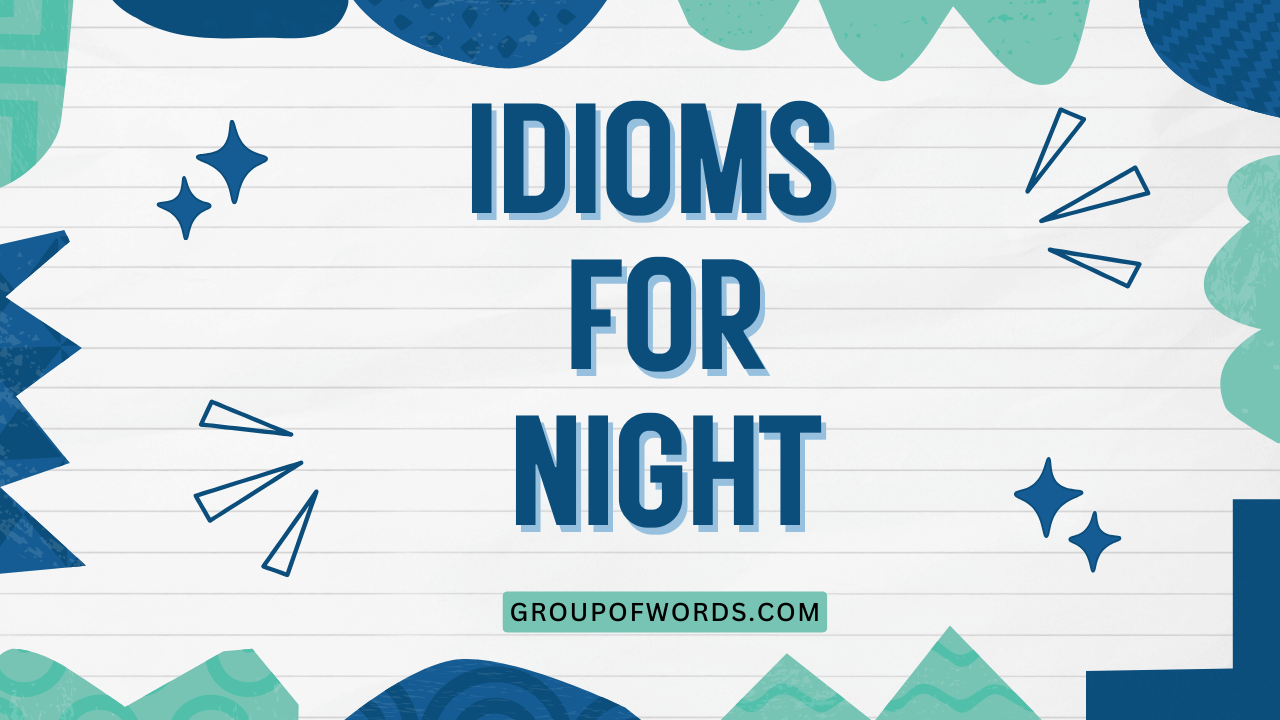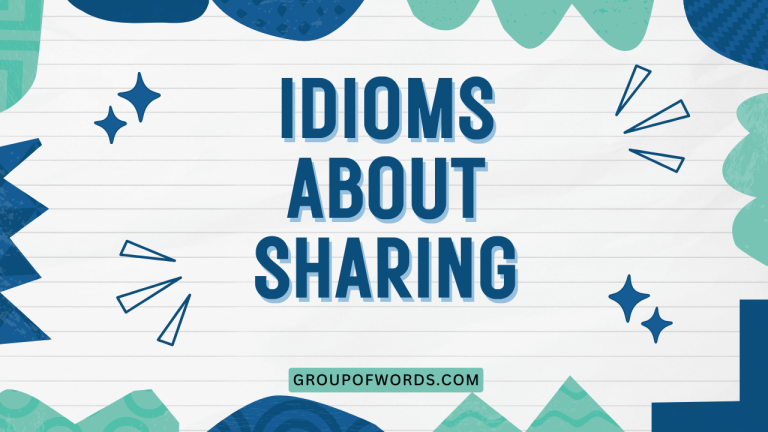Night Owl’s Guide: Mastering Idioms for Night in English
Idioms are colorful expressions that add depth and personality to the English language. Mastering idioms related to “night” can significantly enhance your understanding and fluency, allowing you to communicate more effectively and appreciate the nuances of English.
This comprehensive guide is designed for English learners of all levels, from beginners to advanced speakers, who want to expand their vocabulary and improve their grasp of idiomatic expressions. By exploring various idioms associated with night, you’ll gain insights into their meanings, usage, and cultural contexts, enabling you to use them confidently in both spoken and written communication.
Table of Contents
- Introduction
- Definition of Idioms for Night
- Structural Breakdown of Idioms
- Types and Categories of Night Idioms
- Examples of Idioms for Night
- Usage Rules for Idioms
- Common Mistakes When Using Idioms
- Practice Exercises
- Advanced Topics: The Nuances of Idioms
- Frequently Asked Questions
- Conclusion
Introduction
Idioms are an integral part of the English language, adding color, depth, and cultural context to communication. They are phrases or expressions whose meanings cannot be understood simply by looking at the individual words they comprise.
Instead, idioms have a figurative meaning that is widely recognized by native speakers. Focusing on idioms related to “night” allows learners to explore a specific thematic area, making it easier to remember and apply these expressions in everyday conversations and writing.
Understanding and using these idioms will not only improve language skills but also provide a deeper appreciation for the richness and complexity of English.
This article will guide you through the definition, structure, types, and usage of idioms associated with night. We will delve into various categories, such as idioms related to sleep, darkness, nighttime activities, and the passage of time.
Each idiom will be explained with clear examples and practical usage tips. Additionally, the article will address common mistakes that learners often make and provide practice exercises to reinforce your understanding.
Whether you are a student, a professional, or simply someone who loves learning new expressions, this guide will equip you with the knowledge and confidence to use idioms related to night effectively.
Definition of Idioms for Night
An idiom is a phrase or expression whose meaning is different from the literal meaning of its individual words. Idioms are a type of figurative language, and their meanings are often culturally specific. Understanding idioms is crucial for mastering a language because they are frequently used in everyday conversation, literature, and media. Idioms for night are those idiomatic expressions that use the concept of “night” or nighttime to convey a particular meaning or idea.
These idioms often draw on the symbolic associations of night, such as darkness, mystery, rest, or heightened activity. For example, an idiom like “burn the midnight oil” doesn’t literally mean burning oil in the middle of the night.
Instead, it means to work or study late into the night. Similarly, “night owl” refers to someone who is active and alert during the night, not an actual owl.
The effectiveness of idioms lies in their ability to convey complex ideas in a concise and memorable way.
Idioms can be classified based on their function and the context in which they are used. Some idioms are descriptive, painting a vivid picture of a situation or person.
Others are used to express emotions, opinions, or beliefs. In the context of “night” idioms, we can categorize them based on the specific themes they represent, such as sleep, darkness, activities, or time.
This classification helps in understanding the nuances of each idiom and using them appropriately.
Structural Breakdown of Idioms
Idioms, by their nature, defy simple structural analysis because their meaning is not derived from the individual words. However, understanding some general principles about how idioms are formed can be helpful.
Most idioms consist of a combination of words that, when taken literally, do not make sense in the context of the idiomatic meaning. The structure of an idiom is fixed, meaning that you cannot usually change the words or their order without altering or losing the idiomatic meaning.
For example, the idiom “a night on the town” refers to an evening spent enjoying oneself in public places. You cannot change it to “an evening on the city” or “a night in the town” and maintain the same meaning.
The fixed nature of idioms is what makes them unique and sometimes challenging for language learners. It is essential to learn the specific wording of each idiom to use it correctly.
Idioms can also vary in complexity. Some idioms are simple phrases, while others are more complex sentences.
Regardless of their complexity, the key is to recognize the idiom as a single unit of meaning. In the case of night idioms, the presence of words like “night,” “dark,” or related terms often serves as a clue that the expression might be idiomatic.
Recognizing this can prompt you to consider the figurative rather than the literal meaning.
Types and Categories of Night Idioms
Night idioms can be categorized based on the thematic areas they represent. This classification helps to understand their nuances and use them appropriately.
Here are some key categories:
Idioms Related to Sleep and Sleeplessness
This category includes idioms that describe the act of sleeping, the quality of sleep, or the inability to sleep. These idioms often reflect the importance of sleep in our lives and the various ways we experience it.
Idioms Related to Darkness and Secrecy
These idioms use the symbolism of darkness to convey ideas of secrecy, hidden information, or unknown dangers. They often evoke a sense of mystery or uncertainty.
Idioms Related to Nighttime Activities
This category encompasses idioms that describe activities that are typically done at night, such as working late, partying, or engaging in illicit behavior. These idioms often highlight the unique characteristics of nighttime activities.
Idioms Related to the Passage of Night
These idioms describe how time passes during the night, often emphasizing the length or the emotional experience of the night. They can convey feelings of anticipation, boredom, or restlessness.
Examples of Idioms for Night
To fully understand and use idioms related to night effectively, it is crucial to see them in context. Below are examples of idioms categorized by the thematic areas discussed above.
Each example includes a brief explanation of the idiom’s meaning and how it is used in a sentence.
Examples Related to Sleep and Sleeplessness
This section provides examples of idioms related to sleep and sleeplessness. Understanding these idioms will help you describe different sleep-related situations more vividly.
| Idiom | Meaning | Example Sentence |
|---|---|---|
| Hit the hay | Go to bed | I’m exhausted; I’m going to hit the hay early tonight. |
| Call it a night | Decide to stop what you’re doing for the rest of the night | It’s getting late; let’s call it a night and finish this tomorrow. |
| Lose sleep over something | Worry about something so much that you can’t sleep | Don’t lose sleep over such a small problem; we’ll figure it out. |
| Sleepless night | A night where you can’t sleep | I had a sleepless night worrying about the exam. |
| Toss and turn | To move around restlessly in bed, unable to sleep | I was tossing and turning all night because of the noise outside. |
| Not sleep a wink | Not sleep at all | I didn’t sleep a wink last night because I was so nervous. |
| Sleep like a log | Sleep very soundly | After such a long day, I slept like a log. |
| Burn the midnight oil | Work or study late into the night | I had to burn the midnight oil to finish the project on time. |
| Cat nap | A short, light sleep | I’m going to take a quick cat nap before we go out. |
| Night owl | A person who is active and alert at night | He’s a real night owl; he does his best work after midnight. |
| Early bird | A person who gets up early in the morning | She’s an early bird and likes to get a head start on her day. |
| Sleep on it | Think about something before making a decision | Don’t decide now; sleep on it and tell me your answer tomorrow. |
| Dream the night away | Spend the entire night sleeping and dreaming | She was so tired that she dreamed the night away. |
| Close your eyes | Go to sleep | It’s time to close your eyes and get some rest. |
| In your dreams | Something that is unlikely to happen | You think you’re going to win? In your dreams! |
| Nighty-night | Good night (informal) | Nighty-night, sleep well! |
| Turn in | Go to bed | I’m going to turn in early tonight. |
| Rest your eyes | Take a short nap | Why don’t you rest your eyes for a few minutes? |
| Sleep tight | Sleep well | Sleep tight and don’t let the bedbugs bite! |
| Sawing logs | Snoring loudly | He was sawing logs all night, keeping everyone awake. |
| Nightcap | An alcoholic drink taken before bed | He always has a nightcap to help him relax before sleep. |
| Out like a light | To fall asleep very quickly and deeply | As soon as his head hit the pillow, he was out like a light. |
| Sleep in | To sleep later than usual | I plan to sleep in on Sunday morning. |
| Wide awake | Fully alert and unable to sleep | Despite being tired, I was wide awake all night. |
The table above showcases idioms related to sleep and sleeplessness, providing a clear understanding of their meanings and usage in various contexts. These idioms can help you express yourself more vividly when discussing sleep-related topics.
Examples Related to Darkness and Secrecy
This section provides examples of idioms that use darkness to symbolize secrecy, hidden information, or unknown dangers. These idioms often add a sense of mystery or foreboding to the conversation.
| Idiom | Meaning | Example Sentence |
|---|---|---|
| In the dark | Unaware of something | They kept me in the dark about their plans. |
| A dark horse | A candidate or competitor about whom little is known but who may unexpectedly win | He was a dark horse in the election, but he ended up winning. |
| Darkest before the dawn | The most difficult time is just before a positive change | Things may seem bad now, but remember, it’s always darkest before the dawn. |
| Cloak-and-dagger | Involving secrecy and intrigue | The movie was full of cloak-and-dagger operations. |
| Under the cover of darkness | Secretly, during the night | They escaped under the cover of darkness. |
| Black as night | Very dark | The sky was black as night. |
| Night has a thousand eyes | The night is full of hidden observers or dangers | Be careful what you say; remember that night has a thousand eyes. |
| A leap in the dark | A risky action with unknown consequences | Starting a new business is often a leap in the dark. |
| Dark secret | A secret that is unpleasant or shameful | The family had a dark secret that they tried to keep hidden. |
| Night falls | The time when darkness begins | As night falls, the city lights begin to twinkle. |
| Whistle in the dark | To try to stay cheerful in a frightening situation | He was whistling in the dark, trying to act brave even though he was scared. |
| Shadow of a doubt | A slight doubt | There is no shadow of a doubt that he is guilty. |
| Veiled in secrecy | Hidden or concealed | The negotiations were veiled in secrecy. |
| In the shadows | Hidden or not easily seen | He preferred to work in the shadows, away from the public eye. |
| Night watch | A period of guarding something at night | He was assigned to the night watch. |
| Black market | An illegal market | They were selling goods on the black market. |
| Dark days | Times of trouble or unhappiness | The country went through dark days during the war. |
| A shot in the dark | A wild guess | It was just a shot in the dark, but it turned out to be correct. |
| Pitch black | Extremely dark | The room was pitch black, and I couldn’t see anything. |
| Night vision | The ability to see in low light conditions | Some animals have excellent night vision. |
| Night blindness | Difficulty seeing in low light conditions | He suffers from night blindness. |
| The dead of night | The middle of the night, when it is very quiet and dark | They left in the dead of night to avoid being seen. |
| Night raid | A surprise attack carried out at night | The soldiers conducted a night raid on the enemy camp. |
| Dark matter | A hypothetical form of matter that is believed to make up a large part of the universe | Scientists are still trying to understand the nature of dark matter. |
| Shadowy figure | A person who is mysterious or suspicious | A shadowy figure was seen lurking near the building. |
The table above provides examples of idioms related to darkness and secrecy. These idioms can add depth and intrigue to your language, making your communication more engaging and evocative.
Examples Related to Nighttime Activities
This section includes idioms that describe activities typically done at night, such as working late, partying, or engaging in illicit behavior. These idioms often highlight the unique aspects of nighttime activities.
| Idiom | Meaning | Example Sentence |
|---|---|---|
| A night on the town | An evening spent enjoying oneself in public places | We had a night on the town to celebrate our anniversary. |
| Burning the candle at both ends | Working very hard and getting very little rest | He’s been burning the candle at both ends trying to finish the project. |
| Nightcap | A drink taken before going to bed | He enjoys a nightcap to help him relax. |
| All-nighter | A period of working or studying all night | I had to pull an all-nighter to finish the assignment. |
| Night shift | A period of work that takes place during the night | She works the night shift at the hospital. |
| Night game | A sporting event played at night | We’re going to a night game on Friday. |
| Midsummer night’s dream | A magical or fanciful situation | Their wedding was like a midsummer night’s dream. |
| Night school | Classes taken in the evening | He’s attending night school to get his degree. |
| Night crawler | A person who is active at night, often in a suspicious way | The police caught a night crawler breaking into cars. |
| After dark | After sunset, when it becomes dark | The park is closed after dark. |
| Night market | An open-air market that operates at night | We visited a bustling night market during our trip. |
| Night bus | A bus service that operates at night | I took the night bus to get home. |
| Nighttime economy | Economic activities that take place at night | The city is investing in its nighttime economy. |
| Night train | A train that travels at night | They took the night train to Paris. |
| Nightclub | A place for dancing and entertainment at night | We went to a nightclub to celebrate. |
| Night porter | A hotel employee who works at night | The night porter helped us with our luggage. |
| Night vision goggles | Devices that allow you to see in the dark | The soldiers used night vision goggles during the mission. |
| Night sky | The sky at night, especially when viewed from Earth | The night sky was filled with stars. |
| Night blooming | Flowers that bloom at night | The garden was filled with night blooming jasmine. |
| Midnight feast | A meal eaten late at night | The kids had a midnight feast in their room. |
| Night watchman | A person employed to guard a building at night | The night watchman patrols the factory. |
| Night rider | Someone who travels or rides at night, often for illegal purposes | The night riders were known for their clandestine activities. |
| Night walker | Someone who walks around at night, often aimlessly | He was a night walker, often seen wandering the streets. |
| Nighttime routine | A set of activities done regularly before bed | Her nighttime routine includes reading and meditation. |
| Nightly news | A news program broadcast every night | We watch the nightly news to stay informed. |
The table above presents idioms related to nighttime activities. These idioms can help you describe various nighttime events and behaviors more vividly and accurately.
Examples Related to the Passage of Night
This section provides examples of idioms that describe how time passes during the night, often emphasizing the length or the emotional experience of the night. These idioms can convey feelings of anticipation, boredom, or restlessness.
| Idiom | Meaning | Example Sentence |
|---|---|---|
| Long night | A night that feels long and difficult | It’s been a long night at the hospital. |
| All night long | Throughout the entire night | The music played all night long. |
| The witching hour | Midnight; a time believed to be associated with supernatural events | Strange things always seem to happen around the witching hour. |
| Late night | Happening or done late in the evening or at night | We had a late night working on the project. |
| Through the night | During the night | They traveled through the night to reach their destination. |
| Night after night | Every night | He practiced his guitar night after night. |
| Night is young | There is still plenty of time left in the evening | Don’t worry, the night is young; we have plenty of time. |
| Dawn of a new day | The beginning of a new and better period | The election marked the dawn of a new day for the country. |
| From dusk till dawn | From sunset to sunrise | They worked from dusk till dawn to complete the harvest. |
| Before daybreak | Before sunrise | They had to leave before daybreak to avoid the traffic. |
| Night train | A train that travels at night | We took the night train to avoid rush hour. |
| Middle of the night | The period of time that is halfway between sunset and sunrise | I woke up in the middle of the night feeling thirsty. |
| The still of the night | The quietest part of the night | In the still of the night, you could hear every sound. |
| Night watch | A period of guarding something during the night | He took the night watch to protect the camp. |
| Nightly | Happening every night | The play has nightly performances. |
| Night-to-night | Varying from one night to the next | Her symptoms varied night-to-night. |
| Nightfall | The time when night begins | We reached the camp before nightfall. |
| Night shift differential | Extra pay for working the night shift | She receives a night shift differential for her work. |
| Nightly routine | Actions that you do every night before you go to bed | His nightly routine includes reading a book. |
| Night-time | The period between sunset and sunrise | Night-time is the best time to see the stars. |
| The wee hours | The very early hours of the morning | They stayed up until the wee hours talking. |
| Late into the night | Until very late in the evening or early morning | They worked late into the night to finish the project. |
| Dwell on the night | To think about the events of the night | He would often dwell on the night after it happened. |
| Silent night | A peaceful and quiet night | It was a silent night, with no sounds to be heard. |
| From night till morning | Throughout the entire night | The rain poured down from night till morning. |
The table above features idioms related to the passage of night, helping you express the duration and experience of nighttime more effectively. These idioms can add a sense of time and emotion to your language.
Usage Rules for Idioms
Using idioms correctly requires understanding their specific meanings and contexts. Here are some key rules to follow when using idioms related to night:
- Understand the Meaning: Before using an idiom, make sure you fully understand its meaning. Using an idiom incorrectly can lead to confusion or miscommunication.
- Consider the Context: Idioms are often context-dependent. Choose idioms that are appropriate for the situation and audience.
- Use the Correct Form: Idioms have a fixed structure. Avoid changing the words or their order, as this can alter or lose the idiomatic meaning.
- Be Aware of Regional Variations: Some idioms may have regional variations in meaning or usage. Be aware of these differences and use the appropriate form for your audience.
- Practice: The best way to master idioms is to practice using them in your own speech and writing. Pay attention to how native speakers use idioms and try to incorporate them into your vocabulary.
For example, using “hit the hay” in a formal business meeting would be inappropriate because it is an informal idiom. Similarly, changing “burn the midnight oil” to “cook the midnight oil” would not make sense and would not convey the intended meaning.
By following these usage rules, you can use idioms related to night effectively and confidently.
Common Mistakes When Using Idioms
Learners often make mistakes when using idioms, especially when they are not familiar with the specific meanings and contexts. Here are some common mistakes and how to avoid them:
| Incorrect | Correct | Explanation |
|---|---|---|
| He lost sleep for the test. | He lost sleep over the test. | The correct idiom is “lose sleep over something,” meaning to worry about something. |
| Let’s call it an evening. | Let’s call it a night. | The idiom is “call it a night,” not “an evening.” |
| I will sleep on it tonight. | I will sleep on it. | The idiom is “sleep on it,” meaning to think about something before making a decision. The “tonight” is redundant. |
| They were in the bright. | They were in the dark. | The idiom “in the dark” means unaware. “In the bright” does not convey the same meaning. |
| He is a dark pony. | He is a dark horse. | The idiom is “dark horse,” not “dark pony”. |
Avoiding these common mistakes will help you use idioms related to night more accurately and effectively. Always double-check the meaning and form of an idiom before using it, and pay attention to how native speakers use it in context.
Practice Exercises
Test your understanding of idioms related to night with the following exercises. Choose the correct idiom to complete each sentence.
| Question | Options | Answer |
|---|---|---|
| 1. I’m so tired; I think I’ll __________. | a) hit the book b) hit the hay c) hit the road | b) hit the hay |
| 2. It’s getting late; let’s __________ and go home. | a) call it a day b) call it a night c) call it even | b) call it a night |
| 3. Don’t __________ such a small problem. | a) lose sleep with b) lose sleep for c) lose sleep over | c) lose sleep over |
| 4. They kept me __________ about their plans. | a) in the light b) in the dark c) in the shade | b) in the dark |
| 5. He was a __________ in the election. | a) dark dog b) dark cat c) dark horse | c) dark horse |
| 6. She works the __________ at the hospital. | a) night duty b) night shift c) night work | b) night shift |
| 7. We had __________ to celebrate our anniversary. | a) a night in the town b) a night on the town c) a night at the town | b) a night on the town |
| 8. He’s been __________ trying to finish the project. | a) burning the candle at both ends b) burning the oil at both ends c) burning the lamp at both ends | a) burning the candle at both ends |
| 9. They traveled __________ to reach their destination. | a) through the day b) through the night c) through the week | b) through the night |
| 10. Strange things always seem to happen around __________. | a) the clocking hour b) the talking hour c) the witching hour | c) the witching hour |
These practice exercises will help reinforce your understanding of idioms related to night and improve your ability to use them correctly in various contexts. Review the examples and usage rules if you need further assistance.
Advanced Topics: The Nuances of Idioms
For advanced learners, understanding the nuances of idioms involves recognizing their cultural origins, historical contexts, and subtle variations in meaning. Idioms often reflect the values, beliefs, and experiences of a particular culture, and their meanings can evolve over time.
Exploring the etymology of idioms can provide deeper insights into their significance and usage.
For example, the idiom “darkest before the dawn” reflects a common belief that the most difficult times often precede positive change. Understanding this cultural context can enhance your appreciation for the idiom and its emotional impact.
Additionally, idioms can have subtle variations in meaning depending on the context and tone of the conversation. Being able to recognize and interpret these nuances is a sign of advanced language proficiency.
Furthermore, advanced learners can explore the use of idioms in literature and media. Authors and filmmakers often use idioms to add depth,
color, and authenticity to their work.
Analyzing how idioms are used in different texts can provide valuable insights into their stylistic effects and communicative functions. For instance, a novelist might use the idiom “night owl” to characterize a protagonist who is creative and unconventional, while a journalist might use “cloak-and-dagger” to describe a secretive political operation.
By studying these examples, advanced learners can develop a more sophisticated understanding of idioms and their role in effective communication.
Finally, advanced learners can challenge themselves to create their own original sentences using idioms related to night. This exercise can help to solidify their understanding of the idioms and improve their ability to use them fluently and accurately.
Additionally, they can explore the use of idioms in different genres of writing, such as poetry, fiction, and non-fiction, to experiment with their stylistic effects and communicative potential.
Frequently Asked Questions
Here are some frequently asked questions about idioms related to night:
- Q: Why is it important to learn idioms?
- A: Idioms are an essential part of the English language and are frequently used in everyday conversation, literature, and media. Understanding idioms will help you communicate more effectively and appreciate the nuances of English.
- Q: How can I improve my understanding of idioms?
- A: Read widely, listen to native speakers, and practice using idioms in your own speech and writing. Pay attention to the context in which idioms are used and look up their meanings if you are unsure.
- Q: Are idioms the same in all English-speaking countries?
- A: No, idioms can vary from one English-speaking country to another. Be aware of regional variations and use the appropriate form for your audience.
- Q: Can I change the words in an idiom?
- A: No, idioms have a fixed structure. Avoid changing the words or their order, as this can alter or lose the idiomatic meaning.
- Q: How can I avoid making mistakes when using idioms?
- A: Double-check the meaning and form of an idiom before using it, and pay attention to how native speakers use it in context.
- Q: What is the best way to learn new idioms?
- A: The best way to learn new idioms is to encounter them in context, such as in books, movies, or conversations. Keep a notebook of new idioms and practice using them in your own speech and writing.
- Q: Are there any online resources for learning idioms?
- A: Yes, there are many online resources for learning idioms, such as dictionaries, websites, and language learning apps. Some popular resources include the Oxford Idioms Dictionary, Merriam-Webster’s Learner’s Dictionary, and various language learning platforms.
- Q: How can I use idioms effectively in my writing?
- A: Use idioms sparingly and in appropriate contexts. Make sure that the idioms you use are relevant to your topic and audience, and that they add depth and color to your writing.
- Q: What are some common mistakes to avoid when learning idioms?
- A: Common mistakes include misunderstanding the meaning of an idiom, using it in the wrong context, changing the words or order of an idiom, and using idioms that are too informal or outdated.
- Q: How can I practice using idioms in conversation?
- A: Try to incorporate idioms into your everyday conversations. Listen to how native speakers use idioms and imitate their usage. You can also practice with a language partner or tutor.
Conclusion
Mastering idioms related to night can significantly enhance your English language skills and allow you to communicate more effectively and expressively. By understanding the meanings, usage rules, and cultural contexts of these idioms, you can add depth and color to your speech and writing.
Remember to practice using idioms in various contexts and to pay attention to how native speakers use them. With dedication and practice, you can confidently incorporate idioms related to night into your vocabulary and become a more fluent and proficient English speaker.
Keep exploring, keep learning, and enjoy the richness and diversity of the English language!






